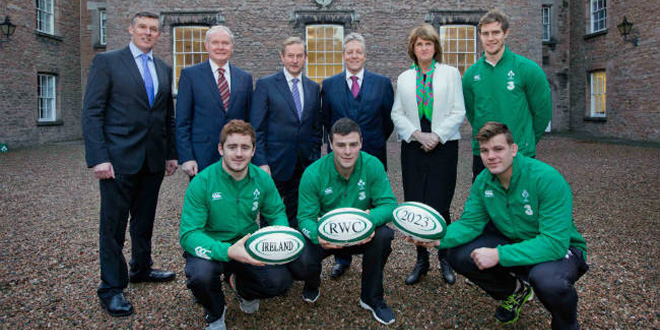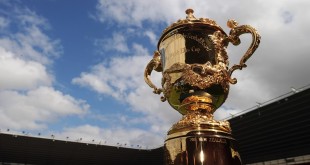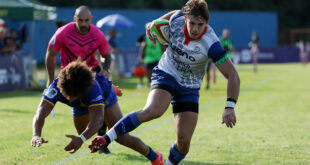Ireland is seeking to host a third Rugby World Cup but do so as the principal host nation for the first time. Matches were staged in the Republic of Ireland and Northern Ireland during Rugby World Cups 1991 and 1999 with Dublin hosting a Semi Final and a Quarter Final in addition to pool matches. It was to host matches again in 2007 only for the reconstruction of the now Aviva Stadium in Dublin to see the matches transferred to France.
Ireland now feels it is time to host again, but this time to do so alone by having all matches played on the island of Ireland. Doing so would mean that the home unions would continue the policy of hosting Rugby World Cup matches every eight years and see England and Wales hosting in 2015 closely followed by neighboring Ireland doing so eight years later.
The possibility of Ireland hosting came about after New Zealand did so in 2011. Interested in having the opportunity of hosting alone Ireland quickly confirmed it was interested in hosting in 2023 and, it would appear, has since been working hard behind the scenes to convince those who hold voting power that Ireland indeed should host.
In speaking out about the work being done Spring said ”I would say at this stage we are already up over the 40% mark”. How can this be when it is not yet known as to who are all the possible countries interested in hosting the tournament? It underlines a significant flaw in the decision making process in that it is not fair for everybody.
At this point in time voters are in no position to make anything remotely close to being an informed decision as they are yet to be presented with all the options. Ireland’s confidence is based on the decision making power being wielded by a select few, of whom all have hosted previous Rugby World Cups to date exclusively.
The distribution of votes on the World Rugby Council is a direct reflection not of the present but, rather, of the past. Having knowledge as to how power is distributed within the council is central to understanding why New Zealand hosted Rugby World Cup 2011 and not Japan and why Italy missed out to England, a previous host, in hosting this year’s World Cup. Based on Spring’s statements Ireland understands it all to well.
Spring’s 40% is, quite simply, members of the ‘Old Boys Club’. A total of eight unions have two votes each and together they represent a direct majority on the World Rugby Council. These eight are Australia, England, France, Ireland, New Zealand, Scotland, South Africa and Wales. They are, in other words, the members of the former Five Nations and Tri Nations annual competitions which Italy and Argentina joined respectively in 2000 and 2012.
In Ireland’s favor is the Time Zone, proximity to other members of the Six Nations Championship and gaining clearance to use GAA stadia. With France and South Africa both officially bidding Ireland therefore cannot rely on these four votes, not unless they are eliminated in the first round of voting, nor can it vote itself. Spring is therefore backing on having the votes of Australia, England, New Zealand, Scotland and Wales. Together they have ten votes or 41.6% of the required votes to win. In the event of a tie the World Rugby Chairman must exercise his vote, the 27th.
The ‘Old Boys Club’ is therefore very much at play and it could see Italy missing out to another European bidder not for reasons for merit but, to the contrary, back-scratching. Looking to make the voting a more legitimate reflection of rugby in the twenty-first century World Rugby CEO Brett Gosper made it known in 2013 that authorities were seeking to have Argentina and Italy given equal voting power to those mentioned above. Both continue to have just a single vote each, or a combined total matching that of Scotland.
Spring curiously compares the World Rugby Council to that of the United Nations Security Council, in that not all members have equal say and, in fact, certain countries have immense influence. He also, however, confirms that Gosper’s promise is to in fact come into effect in the Northern Hemisphere’s autumn of 2015 with more unions being given voting power. The exact nature of this remains unconfirmed but Spring claims ”everybody wants change but nobody wants to lose their strong position.”
Currently getting the backing of the unions with two votes is the difference between winning and losing a Rugby World Cup bid. In order to ensure the legitimacy of World Rugby and the Rugby World Cup, however, decreasing the power wielded by the ‘Old Boys Club’ is absolutely essential. It would make the process significantly fairer for all and the potential for trading matches for votes less likely.
A public backlash occurred when Japan was not chosen for hosting in 2011 and Ireland will need to work hard to convince others that it deserves or the World Cup could face similar criticism. Italy is bidding against Ireland while Argentina’s World Rugby Council member and former Pumas captain Agustín Pichot has stated publicly on numerous occasions that he wants Argentina to have the opportunity of hosting in 2023. With changes to the Council voting structure both will likely obtain notably more votes that they would under the existing set-up.
 Americas Rugby News Rugby news from across the Americas!
Americas Rugby News Rugby news from across the Americas!




